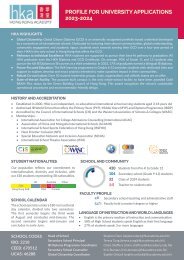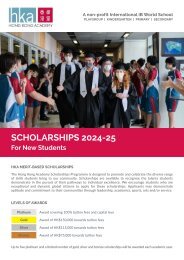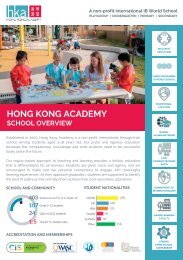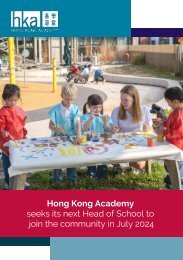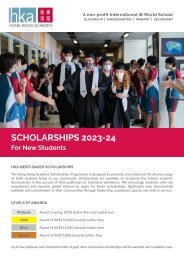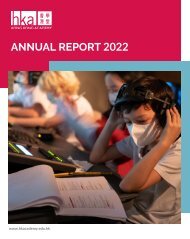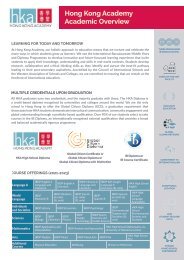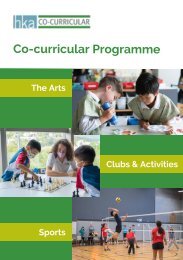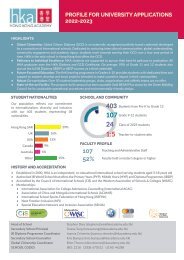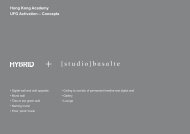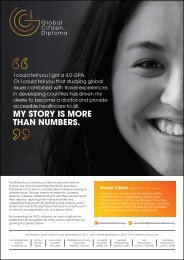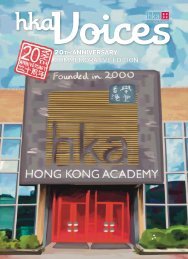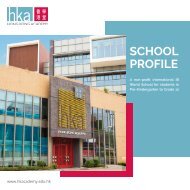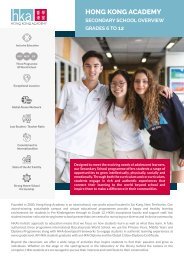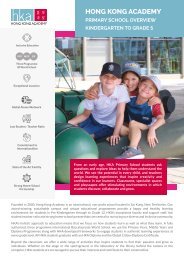Create successful ePaper yourself
Turn your PDF publications into a flip-book with our unique Google optimized e-Paper software.
<strong>hkaVoices</strong><br />
<strong>Autumn</strong> <strong>2017</strong><br />
The dynamics of a lead<br />
international school<br />
hkacademy.edu.hk<br />
Cultivating<br />
STUDENT<br />
LEADERSHIP<br />
and Voice
hka<br />
Voices<br />
letter from the editor<br />
Dear Hong Kong Academy Community,<br />
We’ve heard the question many times: If a tree falls in a forest, and no one is there to hear it, does it make a sound?<br />
This question is often attributed to the 18th century philosopher George Berkeley, but it turns out he may not have actually posed it in<br />
this way. He did draw on the imagery of trees and forests, but what intrigued Berkeley — and continues to intrigue philosophers and<br />
physicists to this day — is whether or not something has to be perceived in order to be real. If you or I personally don’t hear something,<br />
is there actually a sound?<br />
While not settling a more than 400 year old debate, this issue of <strong>hkaVoices</strong> provides a fairly clear answer to this question. Yes.<br />
Whether or not we hear a particular voice, that voice still makes a sound. It is our responsibility to listen to each other’s voices and<br />
to allow ourselves to be changed by what we hear.<br />
As the articles in this issue make clear, HKA is keen to cultivate and listen to students’ voices. I hope you enjoy reading this issue<br />
and making those sounds come alive.<br />
Warmly,<br />
Laura Mitchell<br />
Director of Institutional Advancement<br />
artwork: Lily Robinette, Grade 9
contents<br />
n Authentic Student Leadership 2<br />
n Becoming More Internationally Minded 4<br />
n ELL @ HKA English Language Learning 5<br />
on Many Levels<br />
n Conversations for Growth: 6<br />
Teaching and Learning Standards at HKA<br />
n Social Emotional Learning — Research Based Results 8<br />
n Warming Hearts: 10<br />
HKA’s Youngest Students Make Friends in the Community<br />
n Reaching New Mathitudes 12<br />
n Information and Communications Technology 14<br />
in the Primary School<br />
n The Production of Shockheaded Peter: 15<br />
Students Directing the Creative Process<br />
n Stories About the Bus Go Round and Round 16<br />
n The New Panda Club 18<br />
n Inclusion in Sports 19<br />
n Behind the Scenes Hero | Fanny Chan 21<br />
n Happenings 22<br />
n Contributors inside back cover<br />
33 Wai Man Road<br />
Sai Kung | New Territories | Hong Kong SAR<br />
tel +852 2655 1111 | fax +852 2655 1222<br />
hkacademy.edu.hk<br />
Editor Laura Mitchell<br />
HKA Voices is published twice a year by the communications<br />
Graphic Designer Amie Shaw office of Hong Kong Academy. It is distributed free of charge to<br />
Photography Jamie Cadman alumni, parents and faculty. We welcome input from the HKA<br />
Photography Jennie Tsang community. Please contact Laura Mitchell with your story ideas<br />
or comments at laura.mitchell@hkacademy.edu.hk.<br />
Paper: Mango Satin, a recycled paper with fiber of well managed forestry and Totally Chlorine Free (TCF).<br />
Ink: Soy inks were used for printing. Printer: Pixel Printing, Hong Kong a FSC certified printer.
Authentic Student<br />
Leadership<br />
by Stephen Dare<br />
Early in <strong>2017</strong>, I was one of twenty Heads of<br />
School invited to attend the Klingenstein<br />
Fellowship Program at Columbia University<br />
in New York City. The course is known for<br />
being intense; participants engage in two<br />
weeks of study that include significant<br />
amounts of reading, with written<br />
assignments expected to be completed<br />
at the end of each full day of classes. I<br />
remember one evening in particular at the<br />
end of the first week: we had been asked<br />
to pour over many pages of academic<br />
writing, had two assignments due on<br />
the following Monday morning, and we<br />
were handed the syllabus for the second<br />
week that included two more written<br />
assignments and a final presentation.<br />
When Monday morning arrived and the<br />
professor entered the room, the stress<br />
level in the room was running high. The<br />
professor felt the angst in the room and<br />
asked, “How is everyone doing?”<br />
The professor had clearly asked the right<br />
question. In a few short minutes we (the<br />
students) identified our problem and<br />
advocated for a change in the experience.<br />
The professor listened, presented some<br />
alternatives, and together we worked out a<br />
different learning pathway. The reduction<br />
of the stress in the room was palpable<br />
and immediate. I remember asking the<br />
question: if we can advocate for ourselves<br />
as adult learners, how can we establish<br />
classrooms where younger students feel<br />
as empowered and comfortable to do this<br />
themselves?<br />
Creating a culture in which student voice<br />
can thrive has significant benefits for<br />
learning. Russell Quaglia, renowned<br />
author and advocate for student voice,<br />
suggests that students are seven times<br />
more likely to be motivated to learn if they<br />
believe that they have a voice in their<br />
education. At HKA, student voice takes<br />
a number of forms: sharing opinions<br />
about school-based issues with faculty<br />
and leaders; collaborating with peers to<br />
address problems within the school; and<br />
supporting students to assume leadership<br />
roles that foster change.<br />
At HKA, we have the opportunity to hear<br />
student voices throughout the school<br />
year. The PYP Grade 5 Exhibition and<br />
MYP Personal Projects are a marvelous<br />
opportunity for students to express<br />
themselves and share their personal<br />
passions. Walk around campus and you’ll<br />
see student-created signage encouraging<br />
others to take action to make the school<br />
a better place or to be more mindful of<br />
our carbon footprints. On any given day,<br />
students are engaged in a myriad of<br />
community action and service projects,<br />
whether it’s the garden ambassadors at<br />
work, the student council’s initiatives in<br />
process and, or students making the most<br />
of casual dress days. All are examples<br />
of student voice that can and do lead to<br />
meaningful change.<br />
This spring, HKA hosted the Middle School<br />
GIN conference during which students<br />
2
from more than 20 schools in Southeast<br />
Asia came together and engaged in<br />
dialogue around global themes such as<br />
education, human trafficking, and animal<br />
welfare to create a vision for change.<br />
Additionally, it provided some of our<br />
older students with the opportunity to<br />
demonstrate their leadership skills in<br />
setting up a programme for the more than<br />
200 participants. Following the event I<br />
interviewed the students who contributed<br />
to the success of the GIN conference<br />
about their experiences. I asked them<br />
some key questions related to student<br />
voice, and this is what they told me.<br />
What made you decide to get involved?<br />
Responses included:<br />
My friends got involved.<br />
I wanted to take action to save the world.<br />
I attended a previous conference and thought HKA could do better.<br />
It was an opportunity for creating something different and taking action.<br />
I wanted to get people inspired and educated to take action.<br />
I wanted to do something that would make a lasting impact.<br />
Preparing for and leading the conference was interactive and hands on.<br />
It gave me a chance to tackle out of reach problems.<br />
I thought that it would be fun.<br />
I could bring expertise that would help.<br />
In what ways did the experience help you<br />
to grow as a leader?<br />
Responses included:<br />
Logistics and how to consider the pros and cons of events of different<br />
planning choices.<br />
Effective communication.<br />
Learning to advocate for my point of view.<br />
Public speaking, awareness of personal presentation when standing up<br />
in front of an audience, and gaining confidence in this arena.<br />
Caring for others.<br />
Being available to help and taking the initiative.<br />
Listening to others’ ideas.<br />
Being open-minded and considering the possibility of being wrong.<br />
Allocating tasks, identifying the skill sets of different team members and then<br />
sharing the work accordingly. This enabled the team members to do the things<br />
that they could and do them well.<br />
Trusting each other that each would do their part and get things done.<br />
What suggestions might you give to students<br />
in the future?<br />
Responses included:<br />
Don’t stress out, it’s going to be ok.<br />
Be creative — how you approach problems might be different.<br />
Find the right people.<br />
Be organized.<br />
Develop your speaking skills — communicate with confidence.<br />
Make sure that you can collaborate.<br />
Be ready to adapt and be open to change — help where needed and be flexible.<br />
Work on your problem-solving skills.<br />
Over a dozen HKA students helped make the<br />
GIN Conference a success at HKA, with Anna<br />
Loretan, Cecilia Shin and Valeria Riquelme Lara<br />
playing key planning and implementation roles<br />
leading up to and during the conference.<br />
Given the opportunity to express<br />
themselves about their learning<br />
experiences, the students were extremely<br />
articulate in their responses. What<br />
was striking for me was the extent to<br />
which they were highly motivated by<br />
altruism and less focused on their own<br />
needs as learners. Unlike my adult<br />
experience in Columbia University that<br />
had essentially been motivated by selfinterest,<br />
the students’ motivation for<br />
the GIN Conference was grounded in the<br />
experiences and support that they could<br />
provide for others.<br />
Over the coming months I will be<br />
conducting more formal research as a part<br />
of my doctoral studies to learn more from<br />
students about their perceptions on voice<br />
and the extent to which their voice is<br />
evident within classrooms. As educators,<br />
we have a responsibility to ensure that we<br />
create classroom environments in which<br />
effective student voice can thrive. We<br />
need to be asking the right questions to<br />
promote advocacy for self and others and<br />
we should be checking in with students to<br />
find out how they are doing as learners.<br />
Elevating student voice will require us to<br />
provide students with the tools to express<br />
their needs and engage them in finding<br />
solutions to address these needs in and<br />
out of the classroom. When we listen to<br />
students, it also requires us as adults<br />
to be flexible in our planning, open to<br />
learning from the children in our care,<br />
and willing to change.<br />
3
Becoming More<br />
Internationally<br />
Minded<br />
by Cornel Marais<br />
4<br />
At HKA<br />
we learn how to ...<br />
— incorporate diverse perspectives.<br />
— enhance our awareness of our<br />
place in this shared world.<br />
— make connections through<br />
languages, history and the arts.<br />
— open our minds to new and<br />
challenging thoughts.<br />
— appreciate and celebrate our<br />
diversity.<br />
— be part of a dynamic and<br />
captivating community of people.<br />
— serve not ony one another,<br />
but also our planet.<br />
In years past, receiving an international education might have meant that families living<br />
abroad were able to offer their children an education similar to the one they would have<br />
received back in their own home countries. Technically speaking, this would equate more<br />
to learning within a national curriculum, but in a different country. But in recent years,<br />
the concept of an “international education” has changed significantly and has been the<br />
focus of educational research, philosophy, and practice the world over. Increasingly,<br />
authentic international education has become synonymous with concepts and attributes<br />
such as global citizenship and international mindedness. Rather, it has become a driving<br />
attitude, perspective and characteristic that is being developed in students the world<br />
over, and especially so here at Hong Kong Academy.<br />
What does it even mean to be internationally minded? If you ask 10 different people<br />
you will receive a mix of overlapping ideas and opinions. Even scholars and researchers<br />
struggle to find an agreed upon definition. At HKA we define this vital concept around<br />
two terms: internationalism and interculturalism, both of which we have systematically<br />
embedded into our school’s curriculum and life. Internationalism is a worldview that<br />
aims to unite people across national, political, racial, cultural and class divides to<br />
encourage working together for the betterment of our common humanity. Interculturalism<br />
specifically aims to strengthen a sense of cross-cultural understanding. Our community<br />
here consists of over 40 different nationalities and cultures from across the globe; at<br />
HKA, being internationally minded is not an added extra, but rather is at the heart of<br />
everything we aim to accomplish here.<br />
In order to promote international mindedness, we honour a range of diverse perspectives<br />
and ideas through dialogues and discussion during class; we purposefully seek out a<br />
variety of literature and design units of inquiry that explore different yet interconnected<br />
stories of the human experience. At HKA we to promote international mindedness both<br />
in and out of the classroom in many different ways. For example, in class, we honour<br />
a range of diverse perspectives and ideas through dialogues and discussion. We also<br />
purposefully seek out a variety of literature to read and design units of inquiry that<br />
explore diverse yet interconnected stories of the human experience. At HKA Our students<br />
also take the conceptual understandings gained through their learning and put those<br />
learnings into practice in a variety of different ways. For example, each grade level in the<br />
Secondary School travels to different countries to experience and interact with unique<br />
cultures first-hand. In the past year as a school, our students have travelled to China,<br />
Thailand, Cambodia, Laos, and more. HKA’s annual Community Fair and International<br />
Food Festival is another highlight of the year where parents, students and teachers all<br />
come together to celebrate our diversity together. We particularly honour the culture and<br />
traditions of our host nation by having a dedicated Chinese New Year celebration at the<br />
start of each lunar new year. The more lenses through which we can empathetically look<br />
at one another, the greater our self- understanding, as well as our global understanding,<br />
becomes.
ELL @<br />
Language Learning<br />
HKA<br />
ON many levels<br />
by Denis Wong<br />
We’ve ended up discussing the topic of education in the Grade 6<br />
English Language Learning (ELL) classroom.<br />
“In Sweden we call it gymnasium,” one student explains.<br />
“Like a P.E. gymnasium?” asks another student.<br />
The students exchange a few words in Swedish, followed by a<br />
few more in English. “It’s kind of like university.”<br />
I try to say “gymnasium” like my Swedish students do, but there’s<br />
a phonetic blend in the middle that my throat doesn’t do, and<br />
the kids squint at me funny. “Almost, Mr. Wong.” They encourage<br />
me and then repeat the word again. The actual lesson is about<br />
advertising, but in a classroom where English, Italian, Russian,<br />
Danish, and Cantonese all exist and mix, these diversions into<br />
differences and similarities in language are regular occurrences.<br />
We all become language teachers and students.<br />
In the past two<br />
years, ELL at HKA<br />
has become a<br />
distinct program<br />
within Learner<br />
Support at HKA. The<br />
English acquisition<br />
class is taught<br />
using meaningful<br />
interactions and<br />
situations, with<br />
complete teaching<br />
cycles that allow<br />
students to practice examples of language. The students also<br />
learn how to become more independent and effective in their<br />
communication skills. When we consider the students, we look<br />
for ways to incorporate their strengths and home language to<br />
facilitate English acquisition. Language support is delivered<br />
holistically, both in and out of the classroom, depending on the<br />
needs of the student. We use data from targeted assessments<br />
such as the WIDA MODEL (Measure of Developing English<br />
Language) to track the effectiveness of our methods and progress.<br />
This information is then integrated into the ELL Individual<br />
Learning Plans created for each student.<br />
When working with students acquiring English language<br />
skills, several key questions provide a framework for our<br />
learning:<br />
What does it mean to learn English as a language while also<br />
learning within the language?<br />
How does learning context shape the language choices and<br />
structures?<br />
What are the functions of language?<br />
How can we build upon the strengths of students?<br />
What does it mean to be truly inclusive?<br />
Given the nature of international schools and of Hong Kong<br />
Academy’s population, answering these questions is a complex<br />
and dynamic process. Our community is not only multilingual,<br />
it is multicultural, making the language learning process all<br />
the richer. In our cafeteria and hallways, a sentence beginning<br />
in one language can easily end in another. With this setting in<br />
mind, a priority of the ELL program has been to build an inclusive<br />
environment for language learners. Almost half of our teachers in<br />
the Primary and Secondary Schools have undertaken the Teaching<br />
ESL Students in Mainstream Classrooms (TESMC) certificate,<br />
which is a course that focuses on inclusive methods to teach<br />
English across the curriculum. The participants’ subject areas<br />
range from Drama to Maths to PE to Science, from Early<br />
Childhood to Diploma level.<br />
Learning the English language at HKA does not occur in isolation.<br />
Grammatical accuracy and academic writing are just parts of the<br />
goal in developing English as a form of expression and a medium<br />
for building and shaping knowledge. The ELL program aims to be<br />
a bridge to connect our school’s multiple languages. After all, we<br />
are all language teachers and students.<br />
5
Conversations for Growth<br />
Teaching and Learning Standards at HKA<br />
by Warren Needham<br />
Knowing what makes a “good” teacher can be difficult to define.<br />
We all know a good teacher when we see one, but what are the<br />
skills and dispositions the create the magic of “good” teaching?<br />
Traditionally, schools have used sets of “teaching standards” to<br />
define what it means to be a competent teacher.<br />
were often written in broad, generic terms offering feedback that<br />
had little to do with what the teacher was trying to accomplish<br />
with his or her students. In my experience, this sort of process<br />
didn’t help teachers hone their skills, but it took a lot of time for<br />
supervisor to complete.<br />
Fast forward to the present where my career has moved towards<br />
education administration, and I now find myself as a supervisor.<br />
Through conversations with the educational leadership at HKA,<br />
I again found myself wondering about the value of teacher<br />
standards and I wanted to learn more about new trends in best<br />
practice for evaluating teachers. In the summer of 2015 I had the<br />
opportunity to attend a course at the Principal’s Training Centre<br />
(PTC) entitled “Instructional Supervision and Evaluation - The<br />
Teaching Process”. The PTC, based in Miami, Florida is a global<br />
leader in providing professional development opportunities for<br />
principals. For this course, teachers and administrators from<br />
international schools all over the world gathered together for<br />
seven days to pick apart a variety of teacher standard models<br />
and discuss how we approached teacher standards at our own<br />
schools.<br />
The use of static benchmarks to evaluate teachers and teaching<br />
has always been a curious thing for me. Over the course of<br />
my career, I have taught both at schools which have clearly<br />
articulated what the administration believes makes a good<br />
teacher and at those which haven’t made their expectations<br />
quite as clear. The ones that did spell out their understanding of<br />
quality teaching often spent a lot of time talking to teachers about<br />
those standards, sometimes with great fanfare, only to let those<br />
standards sit in a nice folder on a shelf in the administration<br />
office, never to be seen again. I suppose this was no surprise; as<br />
a teacher, I often found that teaching standards were written as<br />
an intimidating laundry list of “thou shalt do” statements with<br />
equally intimidating tick boxes labeled “unsatisfactory”, “poor”,<br />
“does not meet standards’ and “improvement necessary”. Not<br />
very encouraging language, which often meant teachers didn’t<br />
eagerly adopt the standards in their classrooms.<br />
Equally unsatisfactory to me was the typical approach to<br />
implementing these standards. In my experience, at schools<br />
utilizing traditional teaching standards to evaluate teachers,<br />
supervisors would typically visit classrooms one or two times in a<br />
year, maybe watch a lesson, and then tick off boxes on a form. In<br />
some cases, they might scribble a few hurried comments before<br />
rushing off to the next teacher on their list. The resulting reports<br />
I began the week still harbouring my long held disquiet about<br />
teaching standards, but on the 3rd day I had a conversation<br />
with a fellow student that got me thinking about the differences<br />
between teaching standards that were designed as form of<br />
“quality control” as opposed to standards written to facilitate<br />
teacher growth and development. The latter perspective really<br />
spoke to me, especially when I reflected back on early days in my<br />
own career.<br />
6
“The HKA Teaching and Learning Standards reflect the school’s beliefs and values for<br />
authentic learning; they provide a common language for both adult and student learning<br />
and empower educators to define and pursue pathways to individual excellence through<br />
their own professional journey.” — HKA Teaching and Learning standards, 2016<br />
This conversation got me thinking about teaching standards<br />
in the HKA context. At HKA, we have extremely accomplished<br />
teachers who are professionals in their fields and do not require<br />
management and monitoring. Quite the opposite. We have a<br />
teaching staff who actively seek growth and development and<br />
who want to extend and improve their teaching practices to<br />
positively impact their students’ learning.<br />
The HKA Teaching and Learning standards<br />
support educators to:<br />
Embody and nurture HKA’s mission, vision and values.<br />
Model and promote the skills and attitudes of an internationally<br />
minded person.<br />
Skillfully, collaboratively and positively contribute to the<br />
curriculum cycle.<br />
Use assessment feedback to improve teaching and learning.<br />
Critically evaluate and effectively apply relevant researched<br />
based strategies in a diverse and inclusive setting.<br />
Create a culture of thinking.<br />
Positively and constructively collaborate with all members of the<br />
learning community.<br />
Given this positive, growth mindset among faculty at HKA, my<br />
take away from the PTC course was that at HKA, we could develop<br />
teaching standards that encourage and support our teachers to<br />
do what they are already doing so well. Upon my return to HKA,<br />
I met with our Head of School, Steve Dare, to discuss what I had<br />
learned and my new found perspective on teaching standards.<br />
We pulled out HKA’s existing laundry list style teaching standards<br />
and discussed the various models explored at the PTC. We found<br />
ourselves drawn to a model proffered by Bambi Betts, the director<br />
of the Principal’s Training Centre. This model encompasses a set<br />
of nine statements aimed at provoking conversations. Steven and<br />
I took the statements to the Educational Leadership Team (ELT)<br />
and crafted a set which we felt were relevant to the HKA context.<br />
We then presented these statements to the teaching faculty to<br />
get their ideas about what the statements might look like in our<br />
classrooms.<br />
Our new standards are rooted in the belief that everyone at<br />
HKA has the capacity to grow and develop within our learning<br />
community and are framed to provoke dialogue and discussion.<br />
The result is that we now have the foundation for a dynamic<br />
process for teacher evaluation that allows for growth and change,<br />
often in real time, with immediate impact in the classroom. We<br />
have adopted the “walk through” model for observing what’s<br />
happening in the classroom and then having conversations with<br />
teachers about their own approach. With this model, our teaching<br />
standards are alive — they walk with us — and never succumb to<br />
being a set of documents on a shelf.<br />
And this is just the beginning! Looking to the future, we are<br />
considering ways to make this process even more collaborative<br />
and focused on professional growth. One key element of our<br />
evolving process is the use of intentional conversations that<br />
support teachers in their own individual pathways to success,<br />
just as we do with our students. At HKA, we know that our<br />
teachers are learners, too, and our approach to our teaching<br />
standards is designed to encourage faculty to direct their<br />
own growth and development and explore their aspirations in<br />
improving student learning.<br />
The feedback from teachers prompted a significant shift in<br />
thinking. In addition to eliminating one of the statements, the<br />
educational leadership team recrafted the remaining statements<br />
to include what learning might look like. Consequently the<br />
statements became teaching and learning standards. The<br />
outcome was the following:<br />
7
Social Emotional<br />
Learning —<br />
Research Based Results<br />
by Kira Galbraith<br />
Recent studies have highlighted the<br />
importance of focusing on the whole<br />
child, specifically social and emotional<br />
intelligence, in order to support the<br />
successful development of future<br />
generations. Research shows that<br />
social and emotional learning not only<br />
improves academic achievement, but also<br />
enhances positive social behaviors such<br />
as kindness, sharing and empathy, as well<br />
as improves attitudes toward school and<br />
reduces stress and depression among<br />
students (Weissberg et al., 2016). As such,<br />
there has been a recent shift in education<br />
practices to intentionally integrate<br />
social and emotional learning (SEL) into<br />
educational programs.<br />
What is SEL?<br />
SEL involves the process by which<br />
students develop emotional and social<br />
intelligence, responsible decision making<br />
skills, positive relationships, and learn<br />
how to recognize and avoid negative<br />
behaviors. Apart from developing a<br />
greater awareness of self and others,<br />
SEL also provides an opportunity for<br />
students and teachers to connect beyond<br />
the classroom through fostering a caring<br />
and safe environment where students<br />
feel comfortable connecting and sharing<br />
with one another. This allows for new<br />
relationships to forge and genuine<br />
reflective learning to take place whilst<br />
students are engaging in fun activities.<br />
WHY?<br />
Despite more and more literature<br />
supporting intentional SEL in schools,<br />
there remains some criticism as to why<br />
the focus on adolescent needs has moved<br />
beyond the academic in the classroom.<br />
A recent meta-analysis of SEL programs<br />
representing over 300,000 students from<br />
various parts of the United States, found<br />
that students who participated in SEL<br />
programs within their schools profited<br />
in multiple ways compared to those who<br />
did not experience SEL. Improvements<br />
were found in social and emotional skills,<br />
attitudes about self, others, and school,<br />
social and classroom behaviors, and<br />
academic achievements (CASEL, 2007). It<br />
is no longer enough to offer only academic<br />
subjects, regardless of quality.<br />
Children and adolescents are under<br />
surmounting pressure to navigate the<br />
ever changing dynamics of society today.<br />
Providing a space where students can<br />
dialogue, practice, and explore various<br />
personal and social experiences fosters<br />
deeper peer relationships and allows for<br />
students to connect with their teachers<br />
beyond academic mentoring. It also<br />
allows for a space where students can<br />
explore their identity, values and beliefs,<br />
as well as how they connect with those<br />
around them.<br />
With our increased knowledge of the<br />
importance of SEL in the classrooms,<br />
Hong Kong Academy has designated an<br />
80-minute Advisory block once a week.<br />
Students are formed into smaller groups<br />
of 8-12 and guided through various<br />
activities focusing on awareness of self<br />
and others, self-regulation, relationships<br />
skills, and responsible decision making.<br />
8
The Advisory programme<br />
support students’ academic,<br />
social and emotional wellbeing<br />
by:<br />
n Ensuring that every student has an<br />
advocate who knows him/her well<br />
and who facilitates social and<br />
emotional learning in a proactive<br />
and responsive way;<br />
n Building community amongst<br />
students and staff so that every<br />
student feels a sense of belonging<br />
and respect and experiences an<br />
environment of mutual support;<br />
n Encouraging opportunities for<br />
students to understand their<br />
changing world in ways that lead<br />
to responsible action; Providing<br />
academic mentoring to help students<br />
succeed through an organised,<br />
proactive system of support.<br />
Furthermore, the Advisory Programme<br />
provides an opportunity to support the<br />
development of the whole child and<br />
socio-emotional growth. In working<br />
with children and adolescents, we are<br />
teaching them during a time of rapid<br />
personal development where they are<br />
experiencing social scenarios, physical<br />
changes, and new emotions for the first<br />
time. With guidance through SEL in the<br />
Advisory Programme, they are able to<br />
become better equipped to face such<br />
developmental changes and navigate the<br />
adolescent world with greater awareness.<br />
The foundations of SEL are rooted in an<br />
understanding of self, others, and making<br />
responsible decisions. Through learning<br />
such social skills and an awareness of<br />
self, we are supporting the development<br />
of balanced individuals, who will<br />
ultimately perform better academically.<br />
They will be self-advocates, knowing how<br />
to identify and regulate their emotions,<br />
how to organize and manage their time,<br />
and how to foster positive relationships<br />
with peers and adults. Ultimately,<br />
social and emotional learning at HKA<br />
promotes the development of the whole<br />
child by fostering a positive nourishing<br />
environment where students can flourish.<br />
References:<br />
CASEL (2007). http://www.casel.<br />
org/impact/Weissberg, R., Durlak, J.,<br />
Domitrovich, C., and Gullotta, T. (2016).<br />
“Why Social and Emotional Learning<br />
is Essential for Students”, Edutopia.<br />
Retrieved from: https://www.edutopia.<br />
org/blog/why-sel-essential-for-studentsweissberg-durlak-domitrovich-gullotta<br />
9
Warming Hearts:<br />
HKA’s Youngest Students Make Friends<br />
in the Community<br />
by Marie Baker<br />
“If you want<br />
happiness for an<br />
hour, take a nap.<br />
If you want<br />
happiness for a<br />
day, go fishing.<br />
HKA has a culture of philanthropy and service to others and aims to develop this<br />
through student action. In the Early Childhood department, the PK2 children have been<br />
introduced to the joys of giving through a simple yet heartwarming connection to local<br />
elderly residents.<br />
Over the past several months, HKA’s PK2 classes have been developing relationships<br />
with local residents through the Sai Kung Community Centre, situated just a short<br />
distance from the school campus. In the past, students have visited the centre to sing<br />
songs and participate in simple craft activities with the elders, and we invited the elders<br />
to attend our celebrations during Chinese New Year.<br />
If you want<br />
happiness for a<br />
year, inherit a<br />
fortune.<br />
If you want<br />
happiness for<br />
a lifetime, help<br />
somebody.”<br />
— Chinese Proverb<br />
Recently, 39 elders came to HKA for the morning. We began in the playground with ‘buddy<br />
exercise’, an activity where each student was paired up with an elder and together they<br />
completed simple physical exercises such as bending, stretching, and balancing. At first,<br />
the students seemed a little shy of their new friends, but they soon relaxed and joined<br />
in enthusiastically. Despite the language barrier, both students and elders were able to<br />
follow directions and the activity was enjoyed by all.<br />
Each child then led their ‘buddy’ to the classroom for snack. Students happily served tea<br />
and cakes to the elders and performed both English and Chinese songs for them while<br />
they ate. The children then taught the elders how to sing ‘ 当 我 们 同 在 一 起 ’, the Chinese<br />
version of The More We Get Together, and everyone sang the song together. Although the<br />
elders are predominantly Cantonese speakers, students were able to communicate with<br />
them using basic Mandarin, and the elders attempted some English phrases such as<br />
‘hello’, ‘thank you’ and ‘goodbye’.<br />
Later, the students reflected on how it went. They noticed that the elders had been happy<br />
and smiling during their visit and said that they enjoyed it, too. We talked about the<br />
positive impact we can have on others just by spending time with them and decided that<br />
we would definitely like to invite the elders to HKA again!<br />
10
Quotes from the elders<br />
“I used to be a fisherman. I was very poor<br />
during my childhood and have no chance<br />
to go to school. The visit at HKA is very<br />
special to me because I was like in<br />
school, I hope we can go again.”<br />
— Ms. Lee<br />
“The children are so lovely and we did<br />
“buddy exercise” together! Some of them<br />
was hugging me and I feel like hugging<br />
by my child-daughter” — Ms. Shek<br />
“ I don’t understand what my little buddy<br />
was saying to me, I don’t understand<br />
English, but the little boy was holding my<br />
hands and invite me to visit his<br />
classroom, I feel so happy!’ — Ms. Law<br />
“I used to be school bus driver. The<br />
classroom and the settings in HKA are<br />
different from the local schools, the<br />
class size is smaller, it’s a different<br />
experience!’ — Mr. Yip<br />
Quotes from the children<br />
“She is very happy ‘cos I am hugging her. She loved hugging me. I am happy ‘cos<br />
I love hugging people.” — Zoe Anne<br />
“The grandmas came. We gave out the food and did exercises. I like the exercises<br />
because the grandma and me did exercises together and it made… it made my<br />
heart feel warm.” — Elliott<br />
11
Reaching New Mathitudes<br />
by Maria Tullberg<br />
With a broad smile and an abundance of enthusiasm, a Grade 5<br />
student exclaimed to me, “I really don’t know how to solve this<br />
maths problem, and my brain hurts, this is so much fun. I can’t<br />
wait until I figure this out!”<br />
I replied with encouragement and a smile. “Think about what you<br />
already know, look for patterns, or maybe you can try to look at<br />
the problem from a different perspective.”<br />
conceptual framework that is hands-on and that forces students<br />
to explain why a particular maths strategy works. A maths lesson<br />
often begins with describing a “real world” problem rather than<br />
saying, “Hey everyone, let’s learn division!”<br />
My advice to her, in teacher-talk, was to apply a growth mindset<br />
to the maths problem at hand and to draw on conceptual-based<br />
learning to identify different strategies. While we have always<br />
incorporated these approaches in our toolkit for instruction, in<br />
the last year, we have embraced these thought-provoking shifts<br />
even more as we teach maths in the Primary School. Gone are<br />
the days when we prescribe a single, correct way of solving a<br />
problem or providing the students with a rule to follow when<br />
doing arithmetic.<br />
It all started three years ago when HKA decided to move to<br />
the Common Core, a set of standards developed in the U.S.<br />
The Common Core offers several advantages over other maths<br />
programmes, both for students and teachers, including a<br />
While we have always encouraged students to show their work<br />
so that we can see their thought processes, now we take this a<br />
step further to require students to explain their thinking in detail<br />
before putting pencil to paper. Using the highly effective “build<br />
it-draw it-explain it” process, students focus on the “why” and<br />
the “how”. The “right answer” isn’t just the number at the end;<br />
it’s all the steps along the way. This ensures that the student fully<br />
understands the concept before applying the skill in a real world<br />
maths problem.<br />
In addition to adopting the Common Core, HKA is also taking<br />
seriously new research about how the brain works when learning<br />
maths. This exciting field is led by two eminent scholars: Carol<br />
Dweck, Professor of Psychology at Stanford University and a<br />
pioneering researcher in the field of motivation, and Jo Boaler,<br />
Professor of Mathematics Education at the Stanford Graduate<br />
School of Education. These two women believe fundamentally<br />
there is no “good” maths student or “bad” maths student,<br />
12
ut that rather it is our attitudes towards learning maths that<br />
predict our success in learning maths. Based on their findings,<br />
they recommend that teachers emphasise growth mindsets,<br />
encouraging students to move from thinking, “I can’t do this” to<br />
“I can’t do this yet”.<br />
where we shared best practices, identified resources, and looked<br />
at how to enhance discourse in the classroom. During our Parent<br />
Curriculum Evening in November, it was evident that the parents<br />
enjoyed these new practices as much as the children do!<br />
One of the resources Boaler has developed to help students<br />
develop positive attitudes about learning maths is Youcubed,<br />
www.youcubed.org. This website offers many resources, including<br />
a student and parent section with helpful tips for parents to<br />
encourage mathematical confidence. One immediate takeaway:<br />
parents’ views of themselves as maths learners directly impacts<br />
their children. Who knew that saying, “I am also bad at maths,”<br />
or “I’m not a maths person,” could be so damaging to a child’s<br />
development! But it is, especially when a mother says this to her<br />
daughter.<br />
As a PYP school, it only makes sense to follow the inquiry model<br />
in all subject areas. It has been enlightening to ask ourselves the<br />
simple question, “Why do we treat the subject of Mathematics<br />
so differently from Language Arts or Unit of Inquiry?” When we<br />
explore, wonder and inquire into maths, we are able to change<br />
our mindset from, “I can’t solve this because I don’t remember<br />
how to do long division,” to “What tools and knowledge do I need<br />
to figure this out?” By building confidence and a growth mindset<br />
we make everyone a successful mathematician at HKA.<br />
Since the implementation of the Common Core at HKA, there<br />
has been a continued focus on enhancing our mathematical<br />
practice. Last year we welcomed two professors, both of whom<br />
are prominent in the development of the Common Core, to work<br />
with us in residence to build our knowledge and understanding.<br />
This academic year, the Primary School teachers have been able<br />
to take advantage of six professional development sessions<br />
13
INFORMATION AND<br />
COMMUNICATIONS<br />
TECHNOLOGY<br />
IN THE PRIMARY<br />
SCHOOL<br />
by Bruce Roadside<br />
ICT in the Primary School at HKA is integrated into the whole curriculum as a tool to<br />
support student learning. Throughout the school, teachers along with the technology<br />
integration coach, choose the appropriate technology for teaching, learning and<br />
assessing. Technology is a powerful tool that is meaningfully embedded throughout<br />
learning at HKA.<br />
Students in PK1 to Grade 1 have iPads. The touch screen interface allows for a simplified<br />
interaction with educational tools and applications that enhances learning in the<br />
classroom. The students also have dedicated times when the technology integration<br />
coach joins the classroom to develop the integration of technology and help the students<br />
understand and use different educational applications.<br />
Grade 2 to 5 students are<br />
part of our personalized<br />
technology learning<br />
environment and have access<br />
to their own computer or iPad<br />
in the classroom. This direct<br />
access to technology enables<br />
the teachers and technology<br />
integration coach to integrate<br />
technology into all curriculum<br />
areas, whilst helping students<br />
understand appropriate use<br />
and the responsibility of<br />
maintaining a digital device.<br />
Students also develop and maintain their own digital portfolio; SeeSaw PK1 to Grade 3 or<br />
a website Grade 4 and 5, through which they showcase their learning journey, as well as<br />
learn about issues such as cyber safety, digital ethics and netiquette.<br />
We also endeavor to make parents a part of the learning experience through the class<br />
websites and digital portfolios and ask that parents take an active role in helping<br />
students understand the importance of maintaining balance whilst using technology.<br />
14
The Production of Shockheaded Peter:<br />
Students Directing the Creative Process<br />
by Grade 9 Students HEIDI BOSHOFF, Sophia Chan and Mathea Sobejana<br />
How was the music created<br />
for the show? The show band was<br />
comprised of Grade 10 and 11 students<br />
taking music class. As a part of their<br />
classroom learning, students composed<br />
and arranged almost all of the music.<br />
Some pieces were based on German<br />
music that was inspired by Hoffman’s<br />
original tales; another piece was an HKA<br />
take on The Tiger Lilies’ version of Snip,<br />
Snip transposed by Ben Hiley and sung in<br />
the show by Matilda Nulf (Grade 6). Lastly,<br />
Flying Roberta, an HKA original, was<br />
composed by Dylan Halbroth (Grade 11)<br />
and sung by Ella De Leon (Grade 7).<br />
This year’s Secondary School play was<br />
a production based on a set of German<br />
fairy tales from the nineteenth century.<br />
Originally Der Struwwelpeter (1845)<br />
or Shockheaded Peter, is a German<br />
children’s book by Heinrich Hoffman. It<br />
is comprised of rhymed stories, mostly<br />
about children, and each story has a clear<br />
moral that demonstrates the disastrous<br />
consequences of misbehaviour.<br />
From February to May, students and<br />
teachers worked tirelessly to create an<br />
original piece of theatre. Music students<br />
wrote the music, and Drama students<br />
devised the scenes and choreographed<br />
the dances. Students from across the<br />
Secondary School made wonderful<br />
props, designed and made masks, built<br />
sets, arranged the sound and lights, ran<br />
back-stage, organised costumes and<br />
sold tickets. Everything about this year’s<br />
production was totally original, unique to<br />
HKA and created by our fantastic students.<br />
How did we create each story?<br />
The students were very much involved<br />
in the making of each scene. Nearly<br />
every single story was composed by<br />
the students who performed in them,<br />
offering both artistic and leadership<br />
opportunities for students. Three of the<br />
stories, performed in English, Chinese and<br />
German, were all directed and devised by<br />
students. The dances were choreographed<br />
predominantly by students in Grade 9. The<br />
way we created the scenes was simple:<br />
we all sat down together, read through the<br />
script and discussed how we interpreted<br />
it, and then determined how we would<br />
like to make it come alive on stage.<br />
What did we want the audience<br />
to get out of our performance?<br />
Originally, we wanted the production<br />
to exude a creepy and sort of uncanny<br />
theme. We also wanted the audience to<br />
leave the performance feeling not only<br />
entertained but slightly unsure as to what<br />
just occurred on the stage and slightly<br />
unsure how to react to it.<br />
The Makeup Crew<br />
The Special Effects Team (SFX), an After<br />
School Activity, learned and practiced<br />
various theatrical make up skills to<br />
compliment the characters for the<br />
production. The team included Grade 9,<br />
10, and 11 students Laila Burgin, Maeve<br />
Kelly, Gabrielle Powell, Georgina Reilly,<br />
Jack Robb, Marissa Sosa and Gigi Wong<br />
all contributed their newly found skills<br />
to the play and grew with confidence<br />
week by week. From applying prosthetics<br />
to wig installations to horror makeup<br />
and fanciful and aged looks, the team<br />
collaborated with each other to share tips,<br />
themes and creative ideas.<br />
Overall, the production allowed us to take<br />
on leadership responsibilities which led<br />
to several successful performances. We<br />
have learnt about stage presence, how<br />
to translate ideas into reality, and how to<br />
connect and cooperate with others from<br />
different grades levels. It was amazing<br />
to receive positive feedback from people<br />
who were or were not familiar with<br />
the story. Through this experience, we<br />
showcased our talents, worked hard and<br />
we are all very proud.<br />
15
Stories about the bus<br />
go round and round<br />
by Nicole Bolle<br />
As any parent of a young child knows, buses are prevalent in<br />
children’s literature and stories. You only have to step into the<br />
HKA Primary School Library to find many choices on the topic, The<br />
Magic School Bus, The Hundred Decker Bus, Last Stop on Market<br />
Street, and Don’t let the Pigeon Drive the Bus, just to name a few.<br />
These stories are internationally popular and hold great appeal<br />
with young and adult readers alike. So what cultivates our<br />
continual fascination with buses? What purpose can these books<br />
serve as our students prepare for a new school year? And just<br />
what is it about the bus that helps us better understand both<br />
ourselves and others?<br />
In the stories mentioned, buses are ‘vehicles’ for exciting<br />
journeys. They expose the passengers to diversity both amongst<br />
people and passing environments. They encourage responsibility<br />
and cooperation as well as provide a sense of familiarity, routine<br />
and commitment. Whilst most of the books I found in the PS<br />
Library aren’t exclusively about riding the school bus, they all<br />
address riding the bus in one way or another and can be used<br />
to assist students who may be feeling either super excited or a<br />
little bit nervous. These books can guide us to better manage our<br />
expectations and make the most of the experience.<br />
The tale of students riding the HKA bus is not dissimilar to the<br />
experiences shared in these stories. A trip on a HKA school bus<br />
provides independence, allowing both students and parents alike<br />
to ‘let go’.<br />
The bus ride is also fertile ground for unexpected friendships as<br />
students are able to find commonality and understanding in peers<br />
outside the comfort of a HKA classroom. At the same time, a bus<br />
ride encourages tolerance and understanding as you may have to<br />
share your seat with someone you were not quite expecting.<br />
However, the trip on the school bus is not just about developing<br />
relationships or getting from A to B. The journey on the bus also<br />
provides a window to the ever-changing and diverse face of the<br />
city we have come to or are are starting to call home. The trip<br />
is also an opportunity to engage with our local bus mothers,<br />
whether it be a smile, an attempted or translated conversation.<br />
This is the opportunity for our students to find out about crossgenerational<br />
and international perspectives on an evolving and<br />
continually changing Hong Kong.<br />
And whilst not everything may go according to plan, riding<br />
the bus teaches us that that’s okay, too. Sometimes traffic or<br />
16
poor weather causes a delay, and students (and parents and<br />
helpers) have to be flexible. Our students are still part of a ‘dress<br />
rehearsal’ so to speak, the bus is clearly identifiable and tracked.<br />
Any circumstances of concern are addressed immediately with<br />
our HKA Principals and Facilities & Operation Department. We<br />
benefit from these learning experiences, and our students grow<br />
more confident as they continue to venture on exciting journeys<br />
beyond the doors of HKA.<br />
Books are a great way to share experiences with our children.<br />
The library hosts over 100-bus books, and whilst I have not<br />
read them all, here are a few of my favourites:<br />
Go Bus, Bobby Lynn Maslen (1999), uses the context of a school<br />
bus for introductory readers.<br />
The Little School Bus, Margery Cuyler/Bob Kolar (2014), is a<br />
rhyming tale which follows young children on their journey to<br />
school.<br />
School Bus, Donald Crews (2002), follows the daily routine of the<br />
school bus.<br />
Don’t Let the Pigeon Ride The Bus, Mo Willems (2003,) when a<br />
bus driver takes a break from his route, a very unlikely volunteer<br />
springs up to take his place — a pigeon!<br />
Hundred Decker Bus, Mike Smith (2013), takes us on an adventure<br />
and shows what happens when things don’t quite go as planned.<br />
Last Stop on Market Street, Matt de La Pena (2015), Is an energetic<br />
ride through a bustling city.<br />
A Bus Called Heaven, Bob Graham (2012), is a community focused<br />
story about finding magic in the mundane.<br />
17
The NEW Panda Club<br />
BY Nora Yeung<br />
In January 2016, the Panda Shop got a new name and a new<br />
identity and became the Panda Club. The shift is significant<br />
because it reflects the broader nature of the Mandarin based<br />
learning activities that the Club provides outside the classroom<br />
for Primary School students. By aligning with HKA’s inclusion<br />
policy, we worked on two key areas. First, we designed new<br />
engaging games and activities accessible for students of all<br />
Mandarin levels. The new format was a huge success which<br />
encouraged us to keep going. After 3 more months of trial and<br />
error, positive student and parent feedback, we felt confident to<br />
keep going in this direction. We finished the 2015-2016 school<br />
year with a surprise class visit from Kung Fu Panda (aka Mr. Dean).<br />
When we returned to school in August 2016, fresh and ready<br />
for the new 2016 – <strong>2017</strong> school year, the Panda Club volunteers<br />
focused on our second task: to include all interested parents<br />
in helping to facilitate the games and activities across all grade<br />
levels from K – Grade 5.<br />
At the welcome back and volunteer information coffee morning<br />
during the first week of school, we emphasized that Panda Club<br />
volunteers did not need the ability to speak Mandarin to help with<br />
the Club. Mandarin speaking volunteers are eager and willing<br />
to teach non-Mandarin speaking adults as well as children. In<br />
addition, the presence of non-Chinese parents on the Panda<br />
Club team also speaking or learning mandarin is extremely<br />
18
encouraging for the students. The participation of non-Mandarin<br />
speaking parents helps everyone see and understand better the<br />
different ways children can learn Mandarin as a living language.<br />
We are so happy that The Panda Club parent volunteers are now<br />
as diverse as the students!<br />
With so many creative volunteers and the support of the school,<br />
The Panda Club has been able to incorporate technology and pop<br />
culture into our activities, too. One highlight was the Mandarin<br />
version of the viral hit Pen Pineapple Apple Pen (PPAP) song.<br />
We filmed our students singing their own version in Mandarin<br />
drawing on any combination of words they knew. The video was<br />
then played on a loop on giant TV screens. We all had a blast.<br />
Another well-received and fun activity was showing the students<br />
pictures on iPads of Primary School Principal Virginia Hunt and<br />
Primary School Assistant Principal Dean Johnson going about<br />
their daily activities at school. Students were enthusiastic to tell<br />
us in Mandarin what they were doing, be it eating, teaching or<br />
writing. We could then stimulate more conversation by asking<br />
questions about the photo in more detail.<br />
Our current range of games and activities include Chinese<br />
character or number Bingo, calligraphy, flash cards snap,<br />
sentence making, Pick-up Pandas with Chopsticks, Chinese<br />
Calendar say-the-date/name-the-festival, English-Mandarin<br />
Picture Story Telling Translation and more.<br />
More recently, we created an opportunity for Grades 4 and 5<br />
students to take a more active role as Panda Club Ambassadors.<br />
By empowering the Ambassadors to facilitate the game or activity,<br />
we hope to increase future student involvement and feedback.<br />
One Ambassador from each grade will receive a Profile Star at the<br />
end of the year as a recognition of their helpful participation.<br />
Some Panda Club mums also help the Mandarin teachers with<br />
the reading program and with Chinese cultural activities such<br />
as making dumplings during various Chinese festivities. Their<br />
contribution to cultural learning is invaluable. Parents interested<br />
in helping share Chinese culture are welcome to join! Their<br />
contribution to cultural learning is invaluable. Parents interested<br />
to help and learn some Chinese culture are welcome to join!<br />
In the future, we aim to develop more fun interactive mandarin<br />
programs during and after school. Your support means a lot to<br />
us. For Panda Club updates or to volunteer, please visit the<br />
HKA website for more information.<br />
19
HKA Athletics<br />
Inclusion in Sports<br />
by HEIDI BOSHOFF<br />
At HKA, we value a rigorous and inclusive international education. When we talk about<br />
inclusion, we generally think first of the classroom. But as we experienced in a recent<br />
sporting event, an inclusive mindset is so much more than that. During a football<br />
competition this term, the Dragonfly U12 Boys Team competed in a match with an<br />
opposing team whose goalie had a physical disability. HKA went on to win 5 -2, but more<br />
important than the win was the way in which the boys won. Equipped with an inclusive<br />
mindset, they played well and competed not only with respect for their opponents, but<br />
with enthusiasm for participating in an inclusive match.<br />
This got me thinking about what is an inclusively-minded athlete. What does that look<br />
like? At a very basic level, it means that all persons should be valued and treated in an<br />
equitable and fair manner. To me that’s embodied in our mission statement:<br />
“HKA is committed to maintaining a diverse, collaborative and captivating learning<br />
environment in which students become adaptable, confident and tolerant, equipping<br />
them for the future.”<br />
But what does that imply for kicking a ball from one end of the field to another? To<br />
me, it’s rather simple. In our Sports Programme, we believe it’s about the person, not<br />
the score. Naturally, we all would love to win — and it is good to strive for that — but<br />
it is the athletes that matter, not only the win. At HKA, we emphasise the importance<br />
of respecting and trusting your teammates who are running alongside you or who are<br />
sitting on the bench. In our community, teammates come from all over the world and<br />
have different cultural backgrounds. Sometimes there’s a language barrier to overcome<br />
and different worldviews to understand. But with sport, we focus on the importance of<br />
a shared goal to create connections, foster dialogue and enhance understanding across<br />
multiple perspectives.<br />
By prioritising people in all their diversity (whether teammates or competitors), we<br />
create an environment where empathy and personal concern manifests themselves in a<br />
sense of moral responsibility to others and a commitment to the values of that sporting<br />
community. It is precisely because of this belief in diversity — which is an integral part<br />
of HKA’s core mission — that HKA Sport is working towards offering a variety of sports for<br />
athletes to find their own pathways to excellence. We believe the more opportunities we<br />
create for students, the greater their global perspective and interest will be.<br />
20
Interviewed by by Amelia and Christian, Grade 5 students<br />
Behind the Scenes HERoes<br />
Fanny Chan|<br />
You will always see her with her phone:<br />
an interview with Ms. Fanny<br />
What’s the best part about working in<br />
Hong Kong academy?<br />
Ms. Fanny – “The school events!”<br />
What would be your dream job?<br />
Ms. Fanny – “My dream job is similar<br />
to this work. I like to work with people,<br />
coordinating events and making people<br />
feel satisfied and happy.”<br />
What do you do in your free time?<br />
Ms. Fanny – “I love shopping! Most of<br />
the time I spend time with my family. I<br />
visit my mother. I have one daughter,<br />
she is studying at HKA in Grade 7. I love<br />
travel too. During my holiday, I love to<br />
go on vacation with my family. I enjoy<br />
it very much.”<br />
What part of the school do you run?<br />
Ms. Fanny – “I work in the operations<br />
department for cleaning, maintenance,<br />
and security.”<br />
How long have you been working in Hong<br />
Kong academy?<br />
Ms. Fanny – “In October <strong>2017</strong>, it will be<br />
4 years.”<br />
What was your first job?<br />
Ms. Fanny – “My first job in HK was<br />
working for ESF. I worked in PTA<br />
fundraising and uniforms, but I did have<br />
a job in Canada which was with mutual<br />
funds and as a property manager.”<br />
How many people do you work with?<br />
Ms. Fanny – “I work with about 60 people<br />
in total: 38 bus drivers and bus mothers,<br />
10 cleaners, 2 security guards per shift<br />
and 3 maintenance workers. I cannot<br />
lose them, they are a very important<br />
part of my job.”<br />
Have you ever considered doing the<br />
same job somewhere else?<br />
Ms. Fanny – “Actually, the job before<br />
this one was totally different. I am very<br />
happy to be here because I learn so<br />
much everyday.”<br />
How long does it take to organize<br />
an event?<br />
Ms. Fanny – “We have to be available to<br />
call in case something happens. We use<br />
WhatsApp or telephone. I am available<br />
weekends, weeknights and holidays. It<br />
is hard to say how much time as it also<br />
depends on the event.”<br />
Why did you come to Hong Kong<br />
Academy?<br />
Ms. Fanny – “We came to Hong Kong in<br />
2006 for my husband’s job opportunity.<br />
When I first started here I was the bus<br />
supervisor, but after two months I had the<br />
opportunity to be the Assistant Operations<br />
Manager.”<br />
What is the most important part of<br />
your job?<br />
Ms. Fanny – “Making the school run<br />
smoothly. I work with three departments:<br />
cleaning, security and maintenance. I<br />
cannot miss any one of them. I need their<br />
support to make sure everything is done<br />
right and does not affect the school or<br />
the learning. All departments must work<br />
together.<br />
My record is five events in three days<br />
from Friday to Sunday and then getting<br />
everything ready for school on Monday.<br />
Coordinating the staff and their time is<br />
important; sometimes we have to hire<br />
extra staff. I am very lucky my team<br />
cooperates, works well together and<br />
communicates on WhatsApp. You will<br />
always see me with my phone. My team<br />
is very important to me I cannot do<br />
anything by myself, it is all teamwork.”<br />
Thank you!<br />
21
Happenings<br />
looking back<br />
6 February<br />
London Alumni Event<br />
More than a dozen parents joined the Head<br />
of School for lunch.<br />
16 February<br />
Secondary School Sports Day<br />
27 February - 3 March<br />
Primary School Literacy Week<br />
11 -14 MArch<br />
Adaptive Schools Seminar<br />
HKA hosted the Adaptive Schools Seminar<br />
which shared leading teaching practices.<br />
16-17 March<br />
Grade 2 Exhibition<br />
Phoenixes took their first win in 10 years.<br />
17 February<br />
Primary School Sports Day<br />
Reading was the highlight of everyone’s week<br />
with visiting authors and the Continuous<br />
Reading Chair to dressing as your favourite<br />
book character and pajama day.<br />
1 MArch<br />
Book Fair<br />
4 - 5 March<br />
GIN Conference<br />
Grade 2 students shared their knowledge with<br />
other Primary School students and parents.<br />
21 MArch<br />
Grade 3 Exhibition<br />
Primary School students combined fun and<br />
friendly sports competition for another great<br />
Sports Day!<br />
18 February<br />
Community Fair and<br />
Climbing Wall Inauguration<br />
HKA hosted its first GIN conference,<br />
welcoming students from around the region<br />
for two days of challenging, interactive and<br />
hands-on learning about global issues and<br />
how to address them.<br />
8-10 March<br />
The Grade 3 Exhibition focused on the Unity<br />
of Inquiry theme “Who We Are” and taught<br />
us all about the human body.<br />
21 March<br />
Primary School Music Concert<br />
and Reception<br />
Families enjoyed all the traditional food<br />
and fun of HKA’s annual Community<br />
Fair, combined with the excitement of<br />
inaugurating the school’s indoor<br />
Climbing Wall.<br />
Grade 3 Camp<br />
Grade 3 enjoyed their first HKA camp with fun<br />
water and team building activities.<br />
Each Primary School grade wowed the<br />
audience with their performances.<br />
22
31 March<br />
Coffee House<br />
Secondary Students brought their talents to<br />
the stage and creativity to the canvas for a<br />
great evening.<br />
1 April<br />
Rock and Roll Bowl and Auction<br />
For the second year in a row, parents turned<br />
out for a fun evening of bowling and bidding<br />
to raise funds for the school’s Annual Fund.<br />
Overall, families had contributed more<br />
than HKD 1.8 million in 2016-17, much of<br />
which helps make the new Primary School<br />
Playscapes possible.<br />
6 April<br />
Music Recital and<br />
Grade 12 Visual Arts Exhibition<br />
A classical music recital featuring many<br />
traditions, followed by a reception and the<br />
Grade 12 DP Art Show made for a wonderful<br />
evening of fine arts at HKA.<br />
24 April<br />
Singapore Alumni Event<br />
Former as well as future HKA families<br />
connected with each other, along with former<br />
and current faculty and staff.<br />
5 May<br />
Hot Cocoa House<br />
Primary School students gathered to see a<br />
variety of performances from their peers.<br />
11-12 April<br />
Grade 5 Exhibition<br />
Grade 5 students shared their research,<br />
reflections and actions that addressed<br />
global issues with the HKA community.<br />
17 MaY<br />
Primary School Service Learning Fair<br />
Students met with a variety of non-profit<br />
organizations and learned ways they could<br />
take action to benefit others.<br />
19 May<br />
Shockheaded Peter Performance<br />
The student directed play allowed individuals<br />
to find their own ways to actively engage in<br />
the whole process.<br />
25 MAY<br />
Primary School Art Exhibition<br />
Art filled the halls, hung from the ceiling and<br />
covered the floors for all to enjoy.<br />
25 MAy<br />
Ronaldo Visits HKA<br />
Football super star Ronaldo visited HKA<br />
to a very enthusiastic crowd.<br />
31 MAy<br />
Parent Volunteer Appreciation<br />
Breakfast<br />
Head of School thanked parent volunteers,<br />
one of HKA’s most valuable resources.<br />
2 June<br />
Graduation — Class of <strong>2017</strong><br />
Graduating students celebrated their<br />
accomplishments and looked to the future.<br />
7 June<br />
Secondary School Renaissance<br />
Festival and Grade 10 Exhibition<br />
Shakespeare came to life in many forms at this<br />
year’s festival.<br />
9 June<br />
Grade 4 Play, Recipe for Adventure<br />
Adventures from around the globe right in<br />
the kitchen!<br />
23
Happenings<br />
looking forward<br />
Don’t miss...<br />
BAck to School Coffee<br />
18 August - 8:15 AM at the Theatre<br />
Meet up with friends and welcome<br />
new ones and find out about parent<br />
volunteer opportunities at HKA!<br />
PRimary SChool<br />
back to school Night<br />
31 August<br />
Primary school parents are invited to<br />
meet their children’s teachers and<br />
learn about educational experiences<br />
and activities planned for the year.<br />
Movie Night<br />
21 October - 3:30 PM<br />
Movie (Day and) Night returns with<br />
matinee, followed by dinner in the<br />
cafeteria and an evening show.<br />
Community FaiR<br />
18 November -time 11:00 AM<br />
Mark your calendars now for<br />
this year’s Community Fair on 18<br />
November! With food and fun from all<br />
over the world, the Community Fair is<br />
one of HKA’s most beloved traditions.<br />
Many thanks to Hilde Santens (mom<br />
of Irene ‘15 and Leo ‘17) and Jessica<br />
Wong (mom of Harold ‘16 and Valerie<br />
‘22) who chaired this event for many<br />
years with grace, skill and panache!<br />
And thank you to Hilde’s and Jessica’s<br />
wonderful successors at the helm,<br />
Melita Law, Diana Laudani, and<br />
Masako Yoshino.<br />
HKA Golf Tournament<br />
14 December<br />
Join the fun and support the school<br />
at HKA’s 5th Annual Golf Tournament<br />
at the Clearwater Bay Golf and<br />
Country Club.<br />
Calendar Highlights<br />
16 August<br />
First Day of School - Half Day<br />
18 August<br />
Grades 6-11 Retreats and<br />
Back to School Coffee for HKA Parents<br />
30 August<br />
Grade 12 Higher Education Night<br />
31 August<br />
Primary School<br />
Back to School Night<br />
3-6 September<br />
Foundation Adaptive Schools Seminar<br />
4-6 September<br />
School Photos<br />
7 September<br />
Grades 9-12 Back to School Night and<br />
Learning Outside The Classroom<br />
(LOTC) information evening<br />
14 September<br />
Grades 6-8 Back to School Night and<br />
Learning Outside The Classroom<br />
(LOTC) information evening<br />
19-22 September<br />
Grade 4 & Grade 5 Camp<br />
22 September<br />
Primary School Counsellor<br />
Coffee Morning<br />
27 September<br />
Mid-<strong>Autumn</strong> Festival Celebration<br />
2-6 October<br />
<strong>Autumn</strong> Holiday<br />
10 October<br />
MYP Parent Evening<br />
19 October<br />
Grade 11 Higher Education Night<br />
21 October<br />
Movie Night<br />
23-27 October<br />
Grades 6-8 LOTC<br />
25 October<br />
PSAT for Grades 10-11<br />
31 October - 1 November<br />
Primary and Secondary School<br />
Parent Teacher Student Conferences<br />
(PTSC)<br />
18 November<br />
Community Fair<br />
30 November<br />
Grade 10 Higher Education Night<br />
and Pathways Evening<br />
3-7 DECember<br />
Grades 9-12 LOTC<br />
8 December<br />
Primary School Counsellor<br />
Coffee Morning<br />
13 December<br />
Grade 4 & Grade 5 Concert<br />
14 December<br />
5th Annual HKA Golf Tournament<br />
18 December - 5 JANUARY<br />
Winter Holiday<br />
18 January<br />
Grade 10 Personal Project Exhibition<br />
and Grade 9 Higher Education Night<br />
19 January<br />
Primary School Counsellor<br />
Coffee Morning and Semester 1 Ends<br />
22 January<br />
Semester 2 Begins<br />
7 February<br />
Lunar New Year Assembly<br />
12-19 February<br />
Lunar New Year Holiday<br />
24
hka<br />
Voices<br />
contributors<br />
Amelia And Emily from Grade 5 interviewed<br />
HKA’s Fanny Chan for this issue’s behind the<br />
scenes hero feature.<br />
Marie Baker was born and raised in the UK and<br />
has been teaching Early Childhood Education for<br />
over 16 years. She loves nature and animals and<br />
can often be found in the EC shared area tending<br />
to her pet frogs or in the playground hanging out<br />
with Jeffrey the turtle. In her spare time she enjoys<br />
swimming, hiking, kayaking, reading and eating<br />
sweets with her daughters, Kaela and Ruby.<br />
NICOLE BOLLE is now in her fourth year as<br />
Facilities & Operations Director at HKA. Originally<br />
from Australia, she worked in China and Taiwan<br />
from 2004 to 2007 on various civil and building<br />
construction projects. She moved to Hong Kong<br />
in 2008, continuing this role before starting at<br />
HKA. Nicole has enjoyed working for Facilities at<br />
HKA both in managing and promoting the school,<br />
in particular the unique finishes and collaborative<br />
feel it emanates. Nicole’s favourite thing about<br />
Hong Kong is running through and exploring the<br />
Country Parks. When not at school Nicole enjoys<br />
spending time with her husband and two young<br />
children.<br />
HEIDI BOSHOFF was born in Namibia, raised in<br />
South Africa, travels on an Austrian passport with<br />
Irish-born children and has lived in Hong Kong<br />
for the past 8 years. Heidi studied Sports Science,<br />
specialising in people with disabilities, and is<br />
passionate about seeing people reaching their<br />
full potential. After working nearly two years in<br />
the Learner Support Department, Heidi is now the<br />
Athletics and Activities Coordinator. She has two<br />
children in the Secondary School, Heidi in Grade<br />
9 and Johsua in Grade 11.<br />
Heidi Boshoff, Sophia Chan and Mathea<br />
Sobejana Grade 9 students discuss the making<br />
of this year’s Secondary School Play.<br />
Stephen Dare is the Head of School at<br />
Hong Kong Academy. Before coming to HKA,<br />
Stephen was an administrator at the International<br />
School of Manila. In 2016, he began his doctoral<br />
studies in education and was a Klingenstein<br />
Fellow at Columbia University in <strong>2017</strong>.<br />
KIRA GALBRAITH is in her second year as the<br />
Secondary School Counsellor at HKA. With a<br />
background in humanitarian aid, Kira recently<br />
made a career change into counseling because<br />
of her desire to support the next generation of<br />
global citizens, parents, workers, and leaders.<br />
She is a strong advocate for Positive Psychology<br />
and Social Emotional Learning within education,<br />
and as such has helped spearhead a proactive<br />
and preventative approach to student wellbeing<br />
through the Secondary School Advisory Program.<br />
As a true Seattle native, Kira is often found<br />
running the trails of Hong Kong and searching for<br />
the best coffee in town.<br />
CORNEL MARAIS a native of South Africa, is<br />
in his second year at HKA and his sixth in Hong<br />
Kong. At HKA he works in the Learner Support<br />
department overseeing grades 9-12. He also<br />
previously taught Language and Literature<br />
and currently teaches Individuals & Societies.<br />
He changed careers to become a teacher 11<br />
years ago and has since taught in South Africa,<br />
Taiwan, New Zealand and Hong Kong. He<br />
previously worked as an orthopaedic and cardiac<br />
rehabilitation therapist. Cornel is in his final year<br />
of completing a Masters degree in International<br />
Education Administration through the University<br />
of Sunderland.<br />
WARREN NEEDHAM is an Assistant Principal in<br />
the Secondary School at HKA. Warren has been<br />
teaching for 30 years, including the last 11 years<br />
at HKA. Over the course of his career, Warren has<br />
taught many disciplines in both the primary and<br />
secondary school settings, including health and<br />
physical education, mathematics, music, science<br />
and even geography. He is an avid rugby fan who<br />
loves to watch the Reds and the Wallabies play<br />
and is a former international rugby referee with 7<br />
caps to his name. He is also a keen musician who<br />
plays guitar and sings and can be found playing<br />
at markets and with the HKA staff band Gecko<br />
Bait. He has recently joined a Pink Floyd tribute<br />
band as the lead vocalist and acoustic guitarist.<br />
BRUCE ROADSIDE just completed his second<br />
year as the Primary School Technology Integration<br />
Coach at HKA. Originally from the United States,<br />
he has taught internationally for over 20 years<br />
throughout Europe and Asia. He is passionate<br />
about the effective use of technology for learning<br />
and is expanding his knowledge base to include<br />
how the maker movement can be integrated<br />
into the primary years. Bruce loves to be active<br />
in the outdoors and can be found biking, hiking,<br />
climbing, skiing, and dragonboating in his<br />
free time.<br />
MARIA TULLBERG has lived in all corners of<br />
the world, making her a global citizen and third<br />
culture kid. She considers Hong Kong home<br />
now, and has taught at HKA for seven years in<br />
various grade levels. Previously Maria worked<br />
with communication and administration in<br />
other international schools in Hong Kong. Maria<br />
has a Master’s Degree in Asian Studies and<br />
a Post-Graduate Diploma in Education from<br />
HKU. Recently, Maria completed a certificate in<br />
Mathematics in International Schools K-8, and<br />
she believes that everyone can be a successful<br />
mathematician.<br />
DENIS WONG was born and raised in New York<br />
City. He has been the secondary ELL teacher at<br />
HKA for two years. Prior to HKA, Denis was a high<br />
school English teacher and special education<br />
teacher in the Lower East Side of Manhattan,<br />
where he was part of the New York City Teaching<br />
Fellows program. Denis has a BA in English and<br />
Psychology from Rutgers University, an MA in<br />
Special Education from Long Island University,<br />
and an MFA in Creative Writing from the City<br />
University of Hong Kong. When not thinking about<br />
grammar, Denis is interested in travel, music, his<br />
family, and writing.<br />
Nora Yeung was born in Hong Kong but<br />
grew up in Melbourne, Australia. Nora and her<br />
husband, Allan Jupp have 3 kids at Hong Kong<br />
Academy – Jake in Grade 8, Dylan in Grade 5<br />
and Bianca in Grade 2. Aside from running an<br />
international export business, she is also the<br />
founder of Creative Coding HK and is passionate<br />
about spreading digital literacy and helping kids<br />
to develop a maker mindset. She has enjoyed<br />
being a volunteer and committee member of the<br />
Panda Club for last 3 years. In her spare time,<br />
Nora loves travelling to new places with her<br />
family.
Inquirers<br />
“I am trying to ask questions,<br />
to communicate and be nice.”<br />
— Haelyn, PK2<br />
Inquirers | Knowledgeable | Thinkers | Communicators | Principled | Open-Minded | Caring | Risk-takers | Balanced | Reflective<br />
INQUIRERS We nurture our curiosity, developing skills for inquiry and research. We know how to learn independently<br />
and with others. We learn with enthusiasm and sustain our love of learning throughout life.




